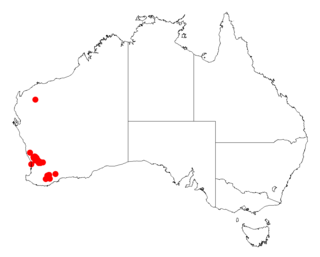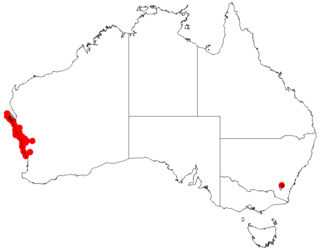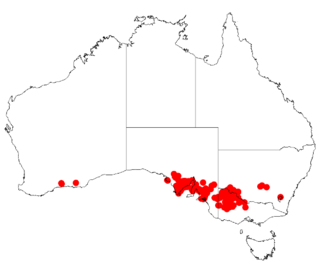
Acacia neriifolia, also known as the oleander wattle, silver wattle or pechy wattle, is a tree in the genus Acacia native to north eastern Australia. It is common in the Moonbi Ranges.

Acacia flexifolia, commonly known as bent-leaf wattle or small winter wattle, is a shrub species that is endemic to eastern Australia.

Acacia levata is a shrub belonging to the genus Acacia and the subgenus Juliflorae that is endemic to small arid area of western Australia.

Acacia crassistipula is a shrub belonging to the genus Acacia and the subgenus Phyllodineae that is endemic to western Australia.

Acacia dempsteri is a shrub belonging to the genus Acacia and the subgenus Phyllodineae endemic to south western Australia.

Acacia idiomorpha is a shrub belonging to the genus Acacia and the subgenus Phyllodineae that is endemic to a small area of western Australia.

Acacia validinervia also commonly known as nyalanyalara, nyala nyala, alumaru or blue wattle, is a shrub of the genus Acacia and the subgenus Phyllodineae endemic to arid areas of inland Australia.

Acacia chrysopoda is a shrub of the genus Acacia and the subgenus Plurinerves that is endemic to an area of south western Australia.

Acacia donaldsonii is a shrub of the genus Acacia and the subgenus Plurinerves that is endemism in an area of south western Australia.
Acacia pelophila is a shrub of the genus Acacia and the subgenus Plurinerves that is endemic to a small area along the west coast of western Australia.

Acacia pharangites, commonly known as Wongan gully wattle, is a shrub of the genus Acacia and the subgenus Plurinerves that is endemic to a small area of south western Australia and is listed as endangered according to the Environment Protection and Biodiversity Conservation Act 1999.
Acacia vincentii is a shrub of the genus Acacia and the subgenus Plurinerves that is endemic to an area of north western Australia.

Acacia vittata, commonly known as Lake Logue wattle, is a shrub of the genus Acacia and the subgenus Plurinerves that is endemic to a small area in western Australia.

Acacia barringtonensis, commonly known as Barrington wattle, is a shrub belonging to the genus Acacia and the subgenus Phyllodineae endemic to New South Wales.

Acacia falciformis, also commonly known as broad-leaved hickory, hickory wattle, mountain hickory, large-leaf wattle, tanning wattle and black wattle, is a shrub belonging to the genus Acacia and the subgenus Phyllodineae that is endemic to eastern Australia

Acacia gladiiformis, commonly known as sword wattle or sword-leaf wattle, is a shrub belonging to the genus Acacia and the subgenus Phyllodineae that is native to parts of eastern Australia.

Acacia halliana is a shrub belonging to the genus Acacia and the subgenus Phyllodineae that is native to parts of south eastern Australia.

Acacia ruppii, commonly known as Rupp's wattle, is a shrub belonging to the genus Acacia and the subgenus Phyllodineae native to eastern Australia. It is listed as endangered in the Environment Protection and Biodiversity Conservation Act 1999.

Acacia torringtonensis is a shrub belonging to the genus Acacia and the subgenus Phyllodineae native to eastern Australia.

Acacia kalgoorliensis is a shrub of the genus Acacia and the subgenus Plurinerves that is endemic to an area of south western Australia.



















